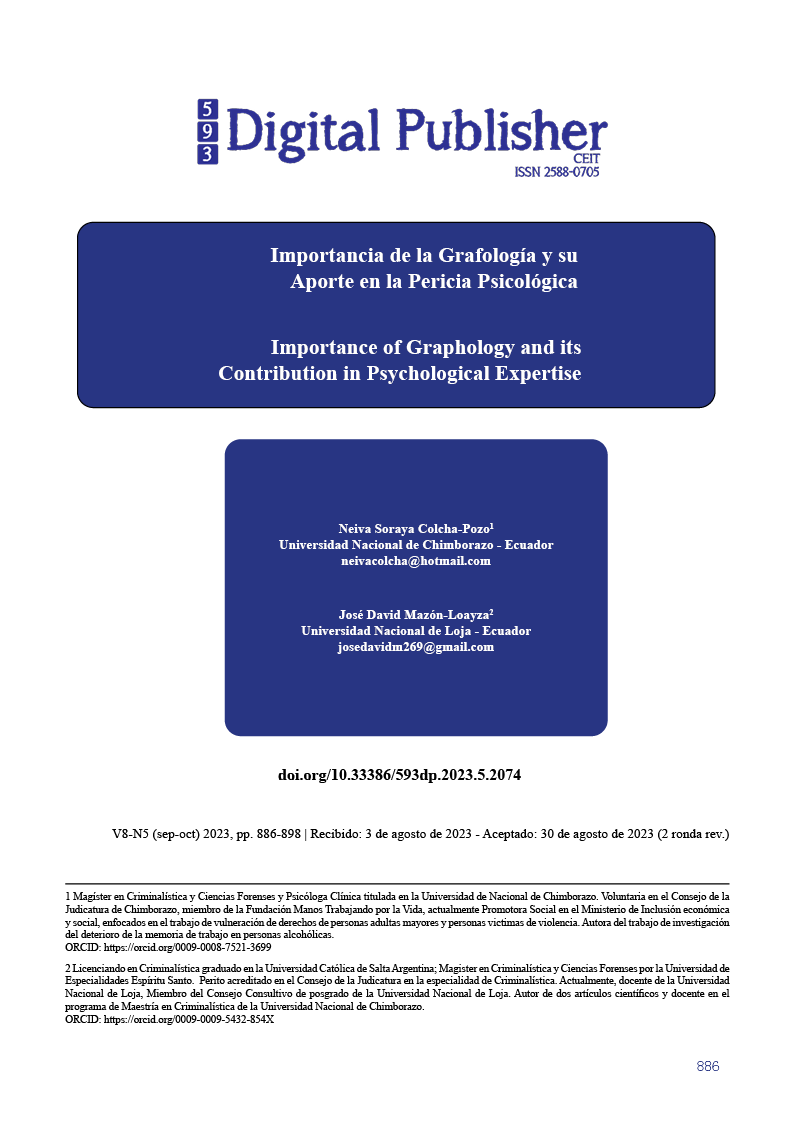Importancia de la Grafología y su Aporte en la Pericia Psicológica
Contenido principal del artículo
Resumen
La grafología es un método de evaluación de la personalidad humana a partir del estilo de escritura del individuo. La personalidad en términos de varios atributos como el miedo, la honestidad, los hábitos de trabajo, las habilidades sociales, entre otros, se pueden perfilar utilizando grafología. El objetivo principal de este estudio se centró en establecer la importancia de su estudio y aplicación como aporte en la pericia psicológica, desde una revisión sistemática de la literatura (RSL). Se realizó una revisión y estimación de las investigaciones preliminares en un periodo de cinco años (2019-2023), operando los motores de búsqueda de Scopus, ScienceDirect, Redalyc, Dialnet, Scielo y SpringerLink. Los estudios se seleccionaron con base en un conjunto de criterios de inclusión y exclusión. Se seleccionaron 256 artículos en español e inglés, excluyendo 185 por no cumplir los criterios. De los 71 restantes, se eliminaron 50 duplicados, aplicando el método de la bola de nieve, para un total de 21 artículos que constituyeron el fundamento de la investigación. Los resultados evidenciaron que la escritura puede proporcionar información sobre la personalidad de una persona, incluyendo su nivel de impulsividad, inteligencia emocional, nivel de ansiedad, estabilidad emocional y otros rasgos significativos que pueden ser relevantes para el diagnóstico y tratamiento psicológico.
Descargas
Detalles del artículo

Esta obra está bajo una licencia internacional Creative Commons Atribución-NoComercial-CompartirIgual 4.0.
1. Derechos de autor
Las obras que se publican en 593 Digital Publisher CEIT están sujetas a los siguientes términos:
1.1. 593 Digital Publisher CEIT, conserva los derechos patrimoniales (copyright) de las obras publicadas, favorece y permite la reutilización de las mismas bajo la licencia Licencia Creative Commons 4.0 de Reconocimiento-NoComercial-CompartirIgual 4.0, por lo cual se pueden copiar, usar, difundir, transmitir y exponer públicamente, siempre que:
1.1.a. Se cite la autoría y fuente original de su publicación (revista, editorial, URL).
1.1.b. No se usen para fines comerciales u onerosos.
1.1.c. Se mencione la existencia y especificaciones de esta licencia de uso.
Citas
Agneessens, F., Trincado-Munoz, F. J., & Koskinen, J. (2022). Network formation in organizational settings: Exploring the importance of local social processes and team-level contextual variables in small groups using bayesian hierarchical ERGMs. Social Networks. https://doi.org/https://doi.org/10.1016/j.socnet.2022.07.001
AL-Qawasmeh, N., Khayyat, M., & Suen, C. Y. (2023). Novel features to detect gender from handwritten documents. Pattern Recognition Letters, 171, 201-208. https://doi.org/https://doi.org/10.1016/j.patrec.2022.08.016
Bottaccioli, A. G., Mariani, U., Schiralli, R., Mari, M. G., Pontani, M., Bologna, M., Muzi, P., Giannoni, S. D., Ciummo, V., Necozione, S., Cofini, V., Chiariotti, L., Cuomo, M., Costabile, D., & Bottaccioli, F. (2023). Empathy at school project: Effects of didactics of emotions® on emotional competence, cortisol secretion and inflammatory profile in primary school children. A controlled longitudinal psychobiological study. Comprehensive Psychoneuroendocrinology, 14, 100183. https://doi.org/https://doi.org/10.1016/j.cpnec.2023.100183
Chaudhari, K., & Thakkar, A. (2019). Survey on handwriting-based personality trait identification. Expert Systems with Applications, 124, 282-308. https://doi.org/https://doi.org/10.1016/j.eswa.2019.01.028
Chitlangia, A., & Malathi, G. (2019). Handwriting Analysis based on Histogram of Oriented Gradient for Predicting Personality traits using SVM. Procedia Computer Science, 165, 384-390. https://doi.org/https://doi.org/10.1016/j.procs.2020.01.034
Da Silva Machado, R., Vieira, I. S., Scaini, C., Molina, M. L., Barbosa, L. P., da Silva, G. D. G., Ores, L., de Mattos Souza, L. D., Jansen, K., & da Silva, R. A. (2023). Ego-defense mechanisms and brief psychotherapies for the management of major depressive disorder in adults: A longitudinal and quasi-experimental study. Journal of Affective Disorders, 330, 291-299. https://doi.org/https://doi.org/10.1016/j.jad.2023.02.141
Dhelim, S., Chen, L., Aung, N., Zhang, W., & Ning, H. (2023). A hybrid personality-aware recommendation system based on personality traits and types models. Journal of Ambient Intelligence and Humanized Computing, 14(9), 12775-12788. https://doi.org/10.1007/s12652-022-04200-5
Durga, L., & Deepu, R. (2021). Ensemble deep learning to classify specific types of t and i patterns in graphology. Global Transitions Proceedings, 2(2), 287-293. https://doi.org/https://doi.org/10.1016/j.gltp.2021.08.025
Elbaghazaoui, B. E., Amnai, M., & Fakhri, Y. (2023). Predicting the next word using the Markov chain model according to profiling personality. Journal of Supercomputing, 79(11), 12126-12141. https://doi.org/10.1007/s11227-023-05125-2
Gao, X. (2022). Research on Expressive Writing in Psychology: A Forty-year Bibliometric Analysis and Visualization of Current Status and Research Trends. Frontiers in Psychology, 13, 825626. https://doi.org/10.3389/fpsyg.2022.825626
Guevara, R. (2016). El estado del arte en la investigación. Folios, 44, 165-179.
Han, Y., & Hyland, F. (2019). Academic emotions in written corrective feedback situations. Journal of English for Academic Purposes, 38, 1-13. https://doi.org/https://doi.org/10.1016/j.jeap.2018.12.003
Kilby, L., & Lennon, H. (2021). When words are not enough: Combined textual and visual multimodal analysis as a Critical Discursive Psychology undertaking. Methods in Psychology, 5, 100071. https://doi.org/https://doi.org/10.1016/j.metip.2021.100071
Kirchherr, J., & Charles, K. (2018). Enhancing the sample diversity of snowball samples: Recommendations from a research project on anti-dam movements in Southeast Asia. PLOS ONE, 13(8), e0201710.
Kobylińska, D., & Kusev, P. (2019). Flexible emotion regulation: How situational demands and individual differences influence the effectiveness of regulatory strategies. Frontiers in Psychology, 10(FEB). https://doi.org/10.3389/fpsyg.2019.00072
Kunhoth, J., Al Maadeed, S., Saleh, M., & Akbari, Y. (2023). Exploration and analysis of On-Surface and In-Air handwriting attributes to improve dysgraphia disorder diagnosis in children based on machine learning methods. Biomedical Signal Processing and Control, 83, 104715. https://doi.org/https://doi.org/10.1016/j.bspc.2023.104715
Li, C., Wei, L., & Lu, X. (2023). Contributions of foreign language writing emotions to writing achievement. System, 116, 103074. https://doi.org/https://doi.org/10.1016/j.system.2023.103074
Liang, Y., Zhao, Y., Ji, W., Bian, X., & Xi, J. (2023). Latent profiles of psychological status among populations cumulatively exposed to a flood and the recurrence of the COVID-19 pandemic in China. International Journal of Disaster Risk Reduction, 85, 103520. https://doi.org/https://doi.org/10.1016/j.ijdrr.2022.103520
Liu, J., Chang, S. S. H., Tan, R. H. S., Teh, W. L., Shahwan, S., Chandwani, N., Lee, Y. W., Chan, C. Y. W., Tor, P. C., & Subramaniam, M. (2023). The interaction between clinically-elevated maladaptive personality traits and global emotion dysregulation elucidates individual differences in mood disorders: Findings from a non-Western clinical sample. Personality and Individual Differences, 214, 112335. https://doi.org/https://doi.org/10.1016/j.paid.2023.112335
Makurdi, L., Guma, Y., Del Estado De Benue, Á., Ekhuemelo, N., & Abah, T. E. T. (2019). Investigation of charcoal production in Makurdi and Guma local government areas of Benue state, Nigeria. Sustainability, Agri, Food and Environmental Research, 7(1), 69-86. https://doi.org/10.7770/SAFER-V0N0-ART1557
Martin, S. R., Heyming, T. W., Fortier, M. A., Jenkins, B., Ahn, K., Cappon, J. P., & Kain, Z. N. (2023). Do Pediatrician Interpersonal and Personality Characteristics Affect Patient Experience? Academic Pediatrics, 23(2), 336-342. https://doi.org/https://doi.org/10.1016/j.acap.2022.06.010
Morales, G., Hernández, A., Peña, B., Chávez, E., & Carpio, C. (2020). Escribir rápido, escribir mejor: interacción entre parámetros temporales y criterios funcionales en universitarios. Journal of Behavior Health & Social Issues, 9(2), 124-131. https://doi.org/10.1016/j.jbhsi.2018.01.009
Muyulema-Allaica, J. C., & Ruiz-Puente, C. (2022). Framework proposal for the design of lean circular production systems based on case studies. DYNA, 97(5), 515-521. https://doi.org/10.6036/10540
Nias, D. K. B. (2016). Hans Eysenck: Sex and violence on television, the paranormal, graphology, and astrology. Personality and Individual Differences, 103, 140-147. https://doi.org/https://doi.org/10.1016/j.paid.2016.04.002
Pal, D., Vanijja, V., Thapliyal, H., & Zhang, X. (2023). What affects the usage of artificial conversational agents? An agent personality and love theory perspective. Computers in Human Behavior, 145, 107788. https://doi.org/https://doi.org/10.1016/j.chb.2023.107788
Park, J. H., Kim, J. Y., & Kim, H. O. (2022). Effects of a group poetry therapy program on stress, anxiety, ego-resilience, and psychological well-being of nursing students. Archives of Psychiatric Nursing, 41, 144-152. https://doi.org/https://doi.org/10.1016/j.apnu.2022.07.027
Quiroga-Bernardos, C., López-Gómez, S., Iglesias-Souto, P. M., Rivas-Torres, R. M., & Taboada-Ares, E. M. (2022). The Detection of Early Reading Performance and Its Relationship with Biopsychosocial Risk Factors in the Study of Learning Difficulties. European Journal of Investigation in Health Psychology and Education, 12(8), 1205-1219. https://doi.org/10.3390/ejihpe12080084
Reynolds, K. A., Rew, J., & Nakamura, M. (2023). Personality disorders in dermatology: A review of patient characteristics, associated dermatologic conditions, and pearls for management. Clinics in Dermatology, 41(1), 105-111. https://doi.org/https://doi.org/10.1016/j.clindermatol.2023.03.009
Robinson, M. D., Persich, M. R., & Irvin, R. L. (2022). An ego effectiveness perspective of successful self-control: An individual difference and its links to social functioning and well-being. Journal of Research in Personality, 97, 104207. https://doi.org/https://doi.org/10.1016/j.jrp.2022.104207
Romo-González, T., Barranca-Enríquez, A., León-Díaz, R., Del Callejo-Canal, E., Gutiérrez-Ospina, G., Jimenez Urrego, A. M., Bolaños, C., & Botero Carvajal, A. (2022). Psychological suppressive profile and autoantibodies variability in women living with breast cancer: A prospective cross-sectional study. Heliyon, 8(10), e10883. https://doi.org/https://doi.org/10.1016/j.heliyon.2022.e10883
Saini, K., & Rathore, R. (2019). Identification of volatile components of gel-pen inks through gas chromatography mass spectrometry. Forensic Chemistry, 11, 98-102. https://doi.org/https://doi.org/10.1016/j.forc.2018.10.006
Snyder, H. (2019). Literature review as a research methodology: An overview and guidelines. Journal of Business Research, 104(August), 333-339. https://doi.org/10.1016/j.jbusres.2019.07.039
Stachowiak, J. (2020). On the civilising of objectification. Language use, discursive patterns and the psychological expertise of work planning. Language & Communication, 74, 52-60. https://doi.org/https://doi.org/10.1016/j.langcom.2020.05.006
Tian, Y., & Ou, L. (2023). How do personality traits of college students affect their learning flow experience? Learning and Motivation, 83, 101917. https://doi.org/https://doi.org/10.1016/j.lmot.2023.101917
Topaloglu, M., & Ekmekci, S. (2017). Gender detection and identifying one’s handwriting with handwriting analysis. Expert Systems with Applications, 79, 236-243. https://doi.org/https://doi.org/10.1016/j.eswa.2017.03.001
Van-Iperen, L. P., de Jonge, J., Gevers, J. M. P., & Vos, S. B. (2022). Linking psychological risk profiles to running-related injuries and chronic fatigue in long-distance runners: A latent profile analysis. Psychology of Sport and Exercise, 58, 102082. https://doi.org/https://doi.org/10.1016/j.psychsport.2021.102082
Vargas, M., & Galeano, H. (2015). El estado del Arte. Formando Investigadores, 6(24), 1-4.
Wang, J., Ren, J., Yuan, C., Shen, Y., Gan, Q., Shi, J., Liu, Q., & Shi, J. (2020). Non-invasive optical micro-identification of ink verification in pen ink handwriting. Results in Chemistry, 2, 100025. https://doi.org/https://doi.org/10.1016/j.rechem.2020.100025
Weinberger, A. B., Garside, E. W., Christensen, A. P., & Chatterjee, A. (2022). Effects of expertise on psychological responses to buildings and natural landscapes. Journal of Environmental Psychology, 84, 101903. https://doi.org/https://doi.org/10.1016/j.jenvp.2022.101903



